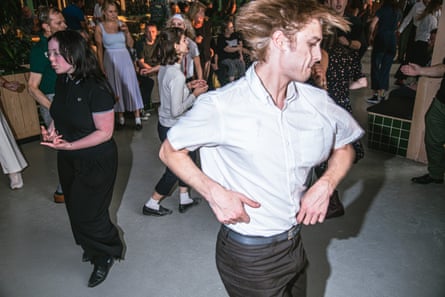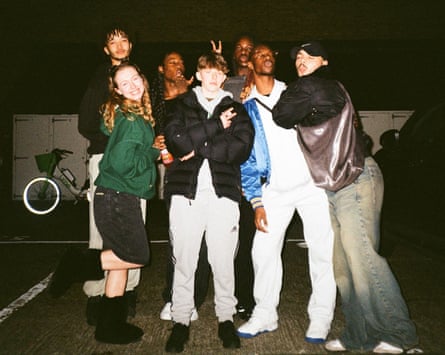I’m the only one who’s not been in. The floor’s open. Someone goes in for their second round, buying me some time with a two-step, a dribble and out. Another agonising pause. I know Tiger’s looking at me – he’s not going to let me get out of this, so I jump in. I’d been working on my running man, but the two‑step is my anchor now. And I just keep two-stepping. It’s fitful, it’s awkward, it’s out of time – but I’m doing it, footworking in the middle of a dance circle. “You’re part of the culture now!” beams Tiger, as I jitterbug back to the sidelines.
It’s my first time attending a footwork practice session, led by the instructor Tiger in the foyer of Central Saint Martins art college in London. I heard about these sessions through an “open decks” night dedicated to footwork, the furiously fast and bassy style of dance music from Chicago. The dance actually came before the music, but that part of it has never really caught on in the UK. Times are changing, though. Not since flailing to dubstep at university have I felt so enthused by the dancing side of club music.
From the twist in the 60s to the migraine skank in the 00s, music fans have always loved to throw down moves – and surely the point of going to a nightclub is to dance. But nowadays that’s often far from the case. Phones have turned clubs into vehicles for social media content, with some DJs becoming exasperated at the way that punters – who often stand still, filming big-screen visuals, or each other – seem more interested in documenting the night than dancing.
This can create a vibe-killing feedback loop. “I asked some friends why they don’t dance in public and some said because of the fear of being filmed,” the rapper Tyler, the Creator recently posted by way of introduction to his dance‑focused new album, Don’t Tap the Glass. “I thought: damn, a natural form of expression and a certain connection they have with music is now a ghost.”
In Britain, it’s also getting harder to go out clubbing at all, due to the cost of living crisis and a drop in the number of nightclubs – about 400 have closed in the past five years. So, across the country, grassroots dance communities are countering this by creating safe spaces for people to learn new moves and feel emboldened to share them on the dancefloor. “People need something to do on a night out,” says Eve Burgsoul, who co-runs Bristol Northern Soul Club with Levanna McLean. Dancing, she says, means “they are in the experience”.
Northern soul spun out of the Twisted Wheel nightclub in Manchester in the 60s before spreading to Wigan, Blackpool and Stafford in the 70s and generating an entire subculture of British people spinning, dipping and doing other elaborate moves to obscure, uptempo US soul music. It survived as a hobby for older generations, but Bristol Northern Soul Club, and other nights like it, have galvanised a younger crowd. Their videos of McLean shuffling to soul classics and pop songs on the streets of Bristol have been such a hit that they have gained traction worldwide. “We’re viral in Russia because our dancing got remixed to a techno song,” says Burgsoul.
Clubbers at Bristol Northern Soul Club nights learn the basics of keeping time and focusing on their feet. Knowing even some rudimentary moves means that “rather than standing there with a drink, waiting for someone to talk to you, you’ve got something to do”, says Burgsoul. “You feel invested in the event,” adds McLean.
Learning to dance opens you up to whole new communities – something those in the ballroom scene know intimately. In the US, ballroom culture has provided solidarity for Black and Latin LGBTQ+ people since the 60s; the dancer Les Child formed the first British vogue collective, the House of Child, in the 80s. These houses can serve as surrogate families for community members estranged from their biological relations, as well as teams that perform for renown and cash prizes.
Vogue is an integral feature of these balls. It’s a sharp battle dance consisting of five basic elements: spins and dips, duckwalk, catwalk, hands and floor. Smily discovered ballroom after he was disowned by his family at 17 and happened upon a vogue class at Studio 25 in Manchester, hosted by the ballroom dancer and Manchester Ballroom Community (MBC) founder Sacha 007. Smily immediately took to the acrobatic style. “Voguing was a wholesome release of dopamine for me,” he says. “I channelled my energy into every move and people enjoyed it. Eventually, I went on to walk in Paris.”
Smily now runs MBC and hosts open sessions where newbies pay to learn the basic elements of vogue. MBC has a large pool of beginners keen to walk balls, but nowhere for them to perform, since most vogue events happen in London and many can’t afford the trip. “Manchester definitely needed more queer, trans, Black and POC [people of colour] spaces,” says Smily. With money from the workshops and other fundraising events, MBC has managed to throw a few balls in Manchester and now hosts one of the city’s first OTA (open to all) vogue nights.
Partnerships such as these are bringing dance out of the studio and into public spaces. In London, the footwork promoter 160 Unity has joined forces with After Werks, the class I attend, resulting in dance circles at the front of their last two nights in London. “The footwork crew has brought something to dance music that I’ve yearned for so long: communal dance,” says Chris Kanski, a 160 Unity punter and After Werks regular. He arrived at After Werks from a background in hardcore punk and metal. “Footwork nights give that spontaneous expression and that challenge that’s so special in hardcore punk. There are eyes on you and people are looking both at what you express and what you can do.”
The same feeling is evident in the UK jazz dance scene, which took off in the 70s as teenagers began leaping, stomping and skipping to the sounds of acid jazz and Latin fusion at clubs such as Chaplins in Birmingham. The craze migrated south, where DJs such as Gilles Peterson turned London into the new mecca of UK jazz dance with his nights at Dingwalls.
It endures today. At the Bath House community building in London, I witness the jazz dance luminary Masumi Endo work tirelessly to encourage bystanders on to the floor for Jazzy Sport London’s No Nation Under a Groove party, which brings together three dance communities: After Werks, Epic Jam (breakdance) and Footnotes (jazz dance). By the end of the evening, the dancing spirit has reached such a fever pitch that the whole room is moving together in one bubbling cauldron of styles.
“There’s nothing like playing to an active audience who are sweating their tits off and really feeling the music,” says Jayson Wynters, who DJs at the jazz dance event Come Sunday at Hockley Social Club in Birmingham alongside Nick Schlittner. One of Come Sunday’s main challenges has been holding on to their young dancers, many of whom move to London in search of job opportunities in TV and theatre. But in M.uuya they have a loyal, 32-year-old regular who relishes the intergenerational side of the event. “It has lineage,” he says. “You’re entering a community that’s larger than that moment in time.”
Back at the footwork dance class, Tiger remembers how bouncers and DJs would welcome him into his local nightclub in Muswell Hill, London, where he went weekly to practise his moves. That was 18 years ago; he wonders whether “DJs and promoters should reach out to dancers more”.
When they do, the effect can be intoxicating: earlier this year, he was the star of the night when the footwork legends RP Boo and DJ Spinn played at Venue MOT in south London. “If I’m doing the Biz Markie” – an old-school hip-hop move – “next to you in the club, I can show you what to do,” he says. And while he believes dancers are inherently free in expression, he argues that knowing some basic moves allows you to have the most amount of fun on the dancefloor.
He’s not wrong. My two-step has kept me occupied during an average club night on Rye Lane in Peckham, London, and my erk’n’jerks – another footwork move – have left me exhausted and elated after a particularly sweaty set in Bermondsey. My dancing isn’t going to save a club from its financial woes, but if promoters can partner with grassroots collectives, organise workshops and encourage dancers to the floor, they can benefit from an integral aspect of club culture that people, old and young, are clearly craving. “People love it,” says Kanski. “It’s real, it’s raw, it’s chaotic, it’s beautiful.”
Come Sunday Monthly Jam is monthly at Hockley Social Club, Birmingham. Bristol Northern Soul Club All Dayer is at Wiper and True Taproom, 9 August. VH1 Ball is at Fulham Pier, 15 August. Footnotes x Jazzy Sport London Monthly Jam is at Next Door Records 2, London, 19 August. After Werks Monthly Open Decks is at AAJA Basement, London, 28 August. 160 Unity is at Fold, London, 5 October











